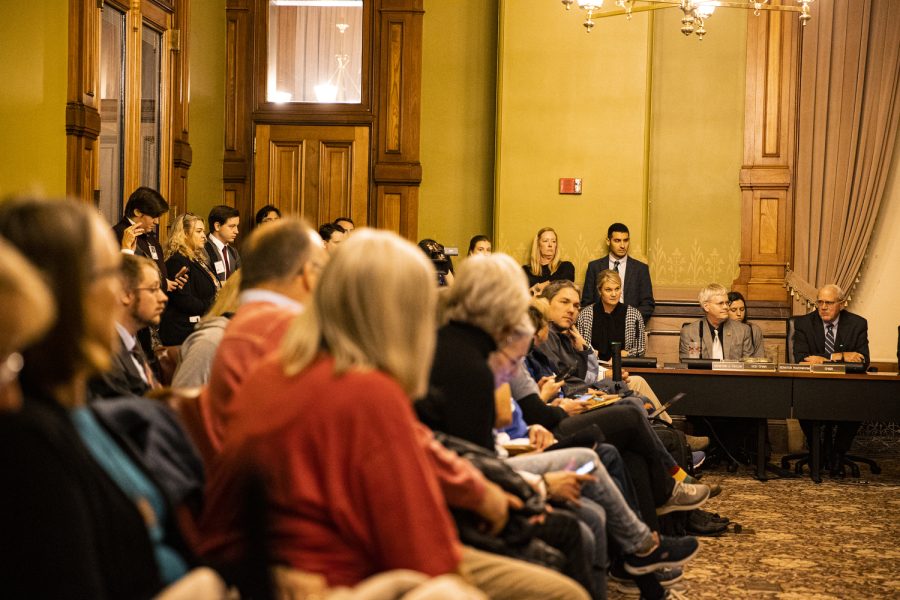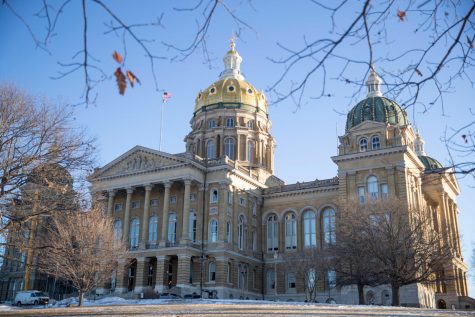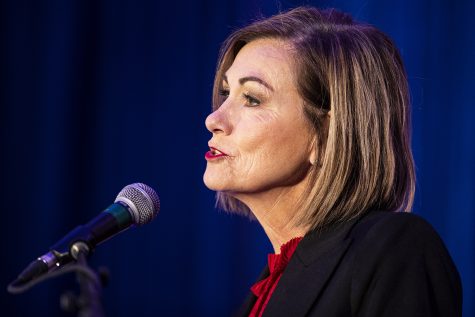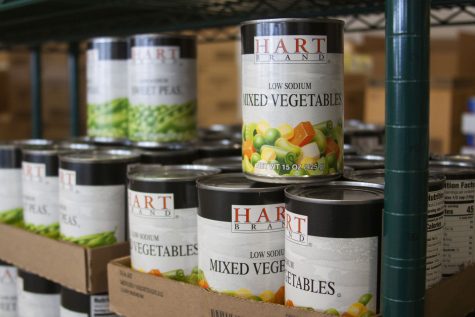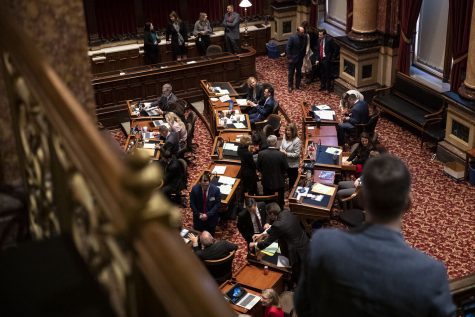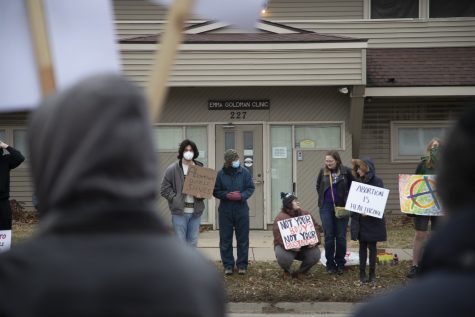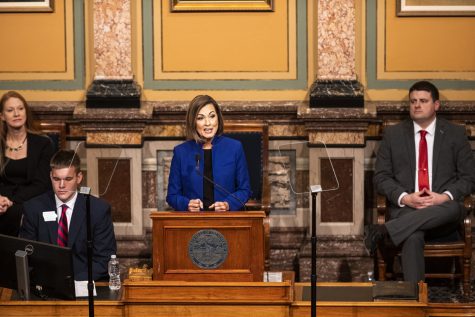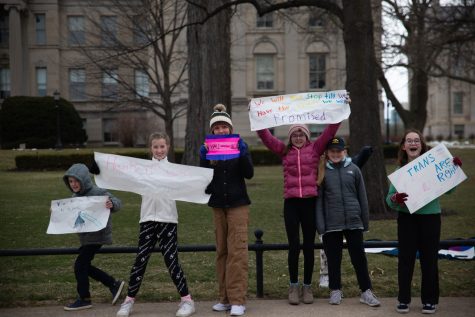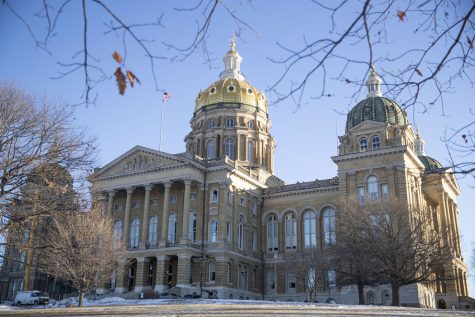Gov. Reynolds revived school voucher bill rapidly advancing
In the third year of discussion over tax-payer-funded private school vouchers, this year’s legislation moves to provide scholarships not only to Iowa’s public school students who transfer to private schools but also to all students currently enrolled in private schools in Iowa.
Sen. Ken Rozenboom leads the Education Committee meeting at the State Capitol in Des Moines on Jan. 11. The meeting was attended by several Iowans who oppose Gov. Kim Reynolds private school voucher bill.
January 17, 2023
Republican leadership in the Iowa House and Senate are rapidly advancing the private school voucher legislation to a floor vote after it was introduced by Gov. Kim Reynolds early last week.
The plan would set aside roughly $7,600 in state funding — the current amount of state-supplemented funding per Iowa public school student — for private school students’ education expenses in Education Savings Accounts. Reynolds, a Republican, said the new plan aims to provide Iowa students choice in education between public and private schools.
Currently, the Senate version of the legislation is expected to come to a vote in the Senate Education Committee after a subcommittee on the bill recommended passage last week. The House version of the legislation is expected to be discussed in the Education Reform Committee in the coming weeks after the committee held a public hearing on the bill Tuesday evening.
Reynolds introduced similar legislation in 2022 that passed the Iowa Senate but failed in the Iowa House of Representatives. Senate File 2369 only provided funding to students transferring from public to private schools and students whose parents made less than $106,000 a year.
Reynolds said she is determined to pass school choice legislation this session after previous attempts failed to pass legislative hurdles.
“Some families may want an education that conforms to their faith and moral convictions. Some kids may have ambitions and abilities that require a unique educational setting. Others may experience bullying or have special needs,” Reynolds said in her Jan. 10 speech. “Regardless of the reason, every parent should have a choice of where to send their child — and that choice shouldn’t be limited to families who can afford it.”
The new legislation would provide funding to all private school students once fully implemented by 2026. In the first budget year, beginning on July 1, if passed, only kindergarten students, current public school students, and private school students who meet income guidelines would be eligible for the funding. All private school students would eventually phase into the program by the fourth budget year.
House Speaker Pat Grassley, R-New Hartford, who chairs the Education Reform Committee, said the legislation is likely to pass the legislature this year, even sooner.
Grassley also said the committee is looking to improve public education and provide parents with more choices.
“I think Republicans are going to be supportive of more choice for parents,” Grassley said to reporters after the governor’s Condition of the State address. “We know that if there is a cost for that we need to be in a position where we can continue to support all education.”
Democrat opposition
Democrats in the House and Senate remain strongly opposed to the legislation. House Minority Leader Jennifer Konfrst, a Democrat from Windsor Heights and ranking member of the education reform committee, said subsidizing private education doesn’t give parents choice in education if their child doesn’t get accepted by the private school.
The legislation does not require private schools to accept all applicants or provide oversight of private schools and their use of tax dollars.
“It really isn’t about choice. Parents don’t have the choice that [Republicans] are talking about if their kid doesn’t learn the same way as everybody else or doesn’t have the same beliefs as that private school,” Konfrst said in an interview with The Daily Iowan. “There are no requirements that [private schools] take every kid. Therefore, tax dollars shouldn’t be subsidizing that kind of selective education.”
According to the Iowa Department of Education, Iowa has about 33,000 private school students that attend 138 private schools throughout the state. However, roughly 80,000 students live in the 41 Iowa counties with no private schools, according to Common Good Iowa, an advocacy group against the governor’s proposal.
The Governor’s Office estimates the program would cost $341 million annually once it is fully implemented. The governor’s recommendation for the state’s next education budget is roughly $1 billion from general fund appropriations and $3.6 billion in supplemental state aid or 42 percent of the state’s budget — including $109 million for the private school financial assistance program.
Konfrst said the legislation doesn’t address already underfunded public schools and takes away more funds from public schools that serve all students.
“We need to be increasing funding [for schools], not just because it’s increasing funding, but because it allows kids to learn better because it provides more resources that they need to learn,” Konfrst said. “Kids come to public schools from all backgrounds, all learning styles, and all sorts of history. We need to be able to teach them all, and that takes resources.”
However, the legislation includes $1,200 for schools per private school student in the school district even if they were not enrolled in public school previously. The governor has also directed the Iowa Department of Education to provide direct assistance and aid to schools that rank in the bottom 5 percent of test scores.
The governor’s budget proposal for the next budget year also includes an increase in state aid to school districts. The governor proposed an $82.8 million increase from the current budget year’s total for state aid, bringing the total to $3.6 billion in state aid to public schools.
This increase represents a 2.5 percent increase in supplemental state aid for Iowa public school districts.
Sen. Ken Rozenboom, a Republican from Oskaloosa and the chair of the Senate education committee, said the plan wouldn’t take money away from public schools.
“There is no diversion of money from public schools to private schools. That is not true, no matter how many times it’s said. It’s not true. This is not a zero-sum game,” Rozenboom said during his opening remarks as chair of the Senate Education Committee. “We in the Legislature have always supported public schools and will continue to do so.”
Educators, including Iowa City Community School District Superintendent Matt Degner, oppose the legislation. Degner said the proposal will cause the most harm to rural districts where schools are the backbone of their community.
“Opportunities will be lost, schools will close, small rural communities will be devastated,” Degner tweeted on Jan. 11. “You cannot have free public education and free private education.”
Iowa State Education Association President Mike Beranek said the plan pulls resources from public education.
“Iowa families already have a choice in where they send their students to school. Iowa families do not want to use public money for private schools to pick and choose whom they will admit,” Beranek said in a statement. “Private school vouchers pull critical resources from public schools, which educate 90% of our students. Iowa families choose public money for public schools.”



